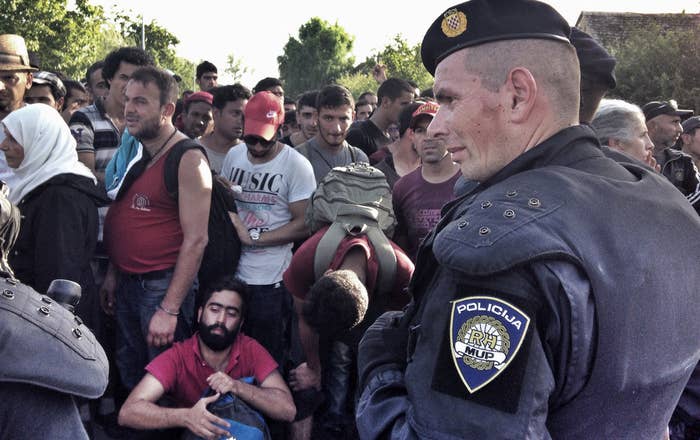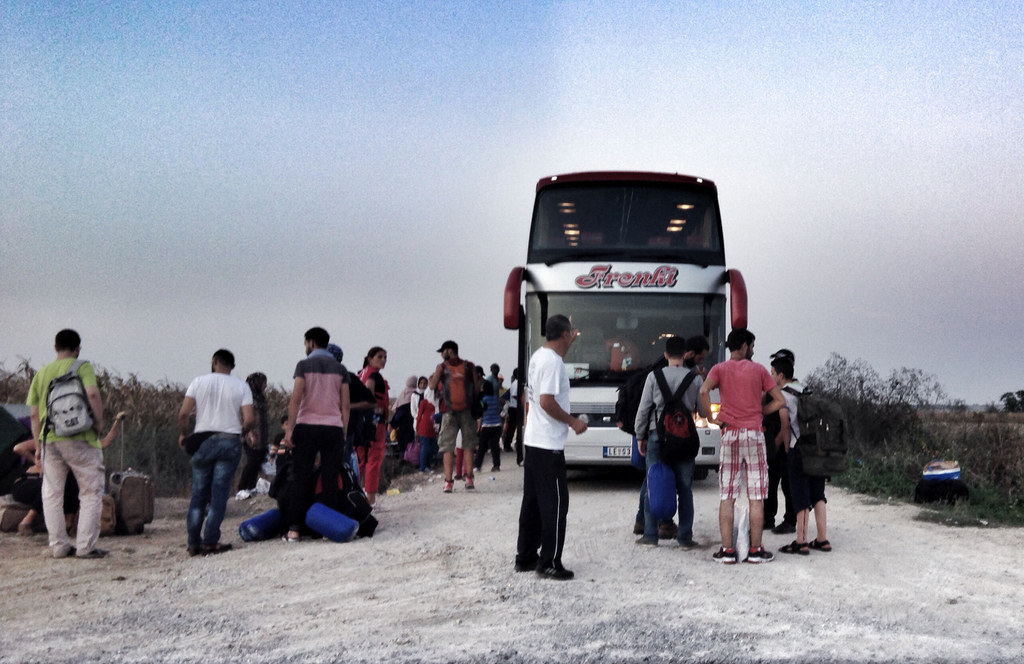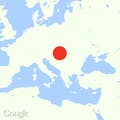
TOVARNIK, Croatia — On Wednesday, Croatian authorities had practically gloated at the prospect of becoming a new transit route for the massive tide of refugees and migrants who have been traversing Europe all summer in search of peace and a better life.
By Thursday afternoon, at the train station in this sleepy, drive-through town near the border with Serbia, reality quickly set in, as the country realized it had become inundated by the human surge. Authorities here said that more than 7,000 people have crossed the border from Serbia since Wednesday, with more or less constant streams continuing to walk through the cornfields around Tovarnik at nightfall.
By late afternoon, police in riot gear had been called in, standing guard across a narrow roadway to keep the migrants from moving freely across the country. A few scuffles broke out, as frustrated refugees pleaded with the police to let them through, or to bring buses more quickly. A few of them passed out, and had to be taken away in ambulances.
Croatia's Interior Minister Ranko Ostojic told reporters on the scene that the country was already at capacity. "Croatia will not be able to receive more people," he said, according to Reuters, while the numbers continued to accumulate around him.

The migrating crowds began to change their routes earlier this week, after Hungary announced it would stop allowing asylum-seekers to cross its territory to reach Austria, and then to Germany. But it wasn't until Hungary repelled a group of refugees at the border crossing near Horgos, Serbia, with tear gas and water cannons on Wednesday, that the pipeline of people in transit, currently estimated to be in the tens of thousands, fully reoriented itself through Croatia.
Croatian authorities had intended to collect the migrants at the train station here in Tovarnik, before moving them by rail to Zagreb, the capital, but the size of the gathering made them worry that it would be impossible to do so without a stampede. Instead, they opted to move them in small batches to another train station a few towns over, but they could hardly keep pace with the new arrivals.
"It worked fine yesterday, when there were just 2,000 people," said a Croatian photographer, who was translating an explanation from a police commander. "But today there are many thousands more. The police were prepared for 2,000."
At one point, the Croatian Red Cross pulled out of the train station area, after it found itself overwhelmed by the demand for water and food, according to one of the medics. "We did it for our safety," he said.
Thomas Truemmel, a 25-year-old volunteer from Austria who had driven to Tovarnik as part of a loosely organized, but highly efficient, volunteer group called SOS Convoy, witnessed the scene. "We had water to give out, but it wasn't nearly enough," he said. "The situation was calm, but it seemed to be escalating, and so when the Red Cross said they were leaving, we left with them. Now there's nobody inside."

Inside the police cordon, Issam Sankari, an IT professional from Aleppo, had spent the afternoon frantically trying to decide what he and his family should do. "They put us in the train station last night," he said. "And then: nothing. No trains, no food. There was a water tank, a single one, but for the past two hours, we had no water to drink."
Around mid-afternoon, Sankari and the rest of those trapped at the train station had broken free of a police barricade and charged across a vacant lot toward a slew of buses that waited to take them to Zagreb, the capital. Shocked at the swarm moving toward them, however, some of the bus drivers shut themselves in their vehicles, while others simply drove away.
That left several thousand migrants to mill about on the grassy fields behind the station, or seek respite from the 97-degree heat in the shade of a metal silo.
As Sankari spoke, his 5-year-old daughter playfully jumped on his back, giggling. The trip out of Syria, he said, arduous though it had been, had at least brought out the innocence in his at daughter again. "In Aleppo, she lived with so much stress all the time, with nowhere to go out and play," he said. "I can already see the life come back to her."

